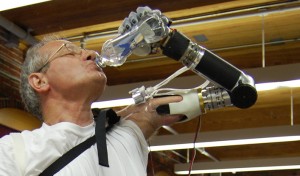 Dean Kamen’s DEKA R&D Corporation has been working on an advanced prosthetic arm for many years, and has just received FDA approval. Next step is to find a manufacturing partner, then they can bring this device to market and provide a level of functionality not before available to amputees. This arm is controlled by electrodes placed on the remaining portion of a wearer’s arm, and translates those signals into actions in the arm, and is the first of its kind to be able to perform multiple simultaneous robotic actions. It may sound mundane..but this arm has enough control to allow users to pick up even fragile objects like grapes and eggs without breaking them, giving their users enormous gains in ability.
Dean Kamen’s DEKA R&D Corporation has been working on an advanced prosthetic arm for many years, and has just received FDA approval. Next step is to find a manufacturing partner, then they can bring this device to market and provide a level of functionality not before available to amputees. This arm is controlled by electrodes placed on the remaining portion of a wearer’s arm, and translates those signals into actions in the arm, and is the first of its kind to be able to perform multiple simultaneous robotic actions. It may sound mundane..but this arm has enough control to allow users to pick up even fragile objects like grapes and eggs without breaking them, giving their users enormous gains in ability.
Check out the video below from 60 minutes to get a better sense of what this arm is all about:


 BPA is one of those chemicals that has caused a lot of fear in recent years…but also some uncertainty. More and more though, it sounds like nasty stuff that’s best avoided (if possible). A new study found a direct correlation between BPA consumption and the rate of cancer in mice (
BPA is one of those chemicals that has caused a lot of fear in recent years…but also some uncertainty. More and more though, it sounds like nasty stuff that’s best avoided (if possible). A new study found a direct correlation between BPA consumption and the rate of cancer in mice (